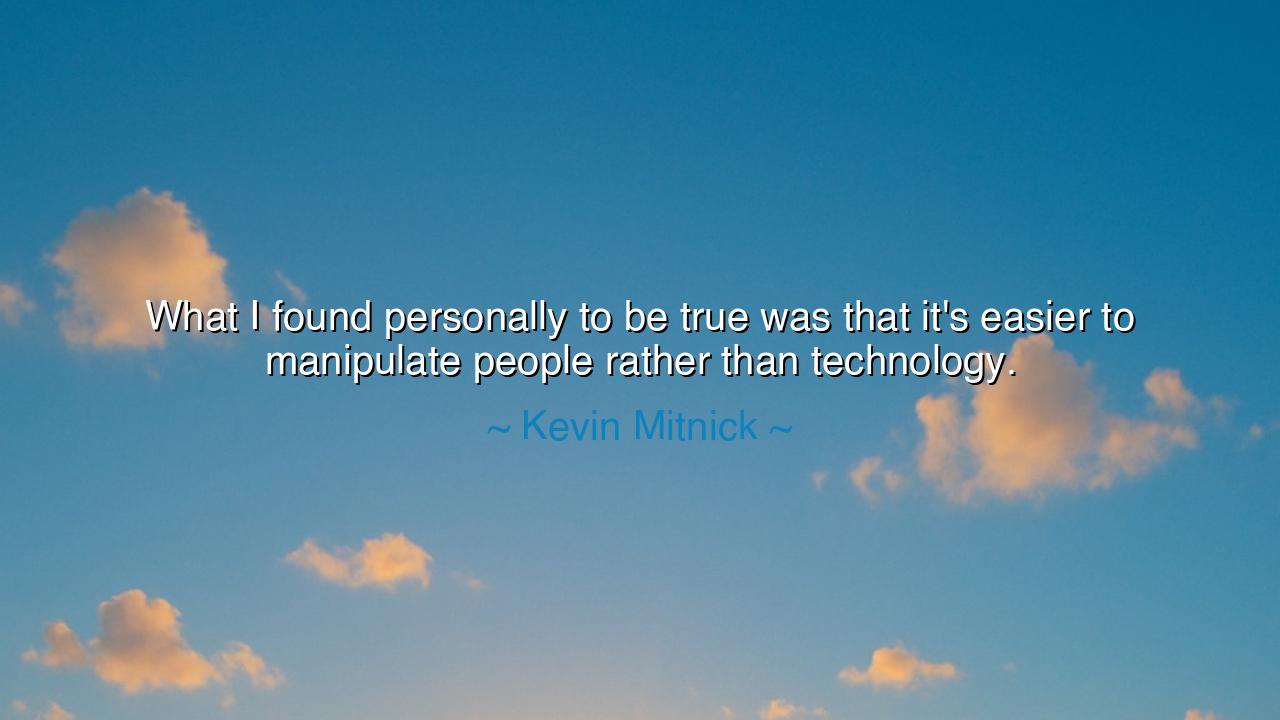
What I found personally to be true was that it's easier to
What I found personally to be true was that it's easier to manipulate people rather than technology.






Hear then the words of Kevin Mitnick, once a figure both feared and revered in the shadowed halls of cyberspace: “What I found personally to be true was that it's easier to manipulate people rather than technology.” These words, though spoken of modern machines, carry the weight of an ancient truth. For from the dawn of civilization, it has been known that the heart of man is softer than iron, more pliable than bronze, and more easily bent than even the gears of any device. What Mitnick discovered in the world of computers is but the echo of a wisdom as old as mankind: it is not the walls, nor the locks, nor the codes that are the weakest defenses, but the souls that guard them.
Consider the power of manipulation. A lock resists with steel, a cipher with mathematics, a program with flawless logic. But the human spirit, though noble, is also filled with longing, vanity, fear, and trust. To touch these strings is to command an instrument of infinite notes. Mitnick, master of the art of “social engineering,” did not always conquer by breaking into machines with brute force. Rather, he often walked through the open gates of human weakness, cloaked in persuasion, pretense, and confidence. Thus he proved that the surest door into any fortress is not its iron gate but the mind of the guard who stands before it.
The ancients, too, knew this truth. Recall the tale of the Trojan Horse, that cunning stratagem by which the Greeks conquered mighty Troy. The walls of that city were high, their gates unyielding, their warriors fierce. For ten years the Greeks could not shatter stone with sword nor fire. Yet in a single night, by the manipulation of men’s trust, the city fell. The Trojans welcomed the gift, believing in honor and goodwill, but their faith was turned against them. Thus was Troy undone—not by the failure of walls, but by the easier path of deceiving hearts.
So too in the modern age did Mitnick unveil that the most advanced technology is helpless when those who wield it are careless. A password may be encrypted, but the man who owns it may be tricked into giving it away. A computer may be secure, yet the operator may be flattered, frightened, or fooled. The mind of man, when unguarded, becomes the weakest keyhole through which the cunning may pass. And this lesson is not for the digital world alone; it is a mirror for all of life, in matters of trust, politics, commerce, and even love.
But let us not despair at this revelation. Instead, let it rouse us to wisdom. If it is easier to manipulate people than machines, then we must strive to fortify not merely our systems but our souls. We must be watchful, discerning, slow to trust the stranger who speaks too smoothly, cautious of the gift too freely given, mindful of the story too easily believed. For the true defense lies not in walls nor codes, but in the clarity of judgment and the strength of spirit.
History shows us examples both of ruin and of triumph. During the Second World War, the Allies devised elaborate deceptions, from false radio chatter to inflatable tanks, to mislead the Axis powers. Men were persuaded to see what was not there, and entire armies were moved on illusions. Here, manipulation was wielded as a weapon, not against machines, but against the very minds of generals. Victory was secured not merely by steel and gunpowder, but by mastery of perception. Thus, the wise see that battles of flesh and iron are often won first in the realm of thought.
Therefore, children of the future, take heed: the human heart is both the greatest treasure and the greatest weakness. Guard it well. Train your mind to question, your tongue to measure, your ears to discern. Do not be swayed by flattery, nor ensnared by fear, nor lulled by the promise of ease. Seek truth with patience, and protect trust with vigilance. Just as the ancients built walls around their cities, so must you build walls around your thoughts—walls not of stone, but of discernment.
And finally, let this be your guiding action: strengthen both your knowledge and your character. Learn the tools of your age, yes, but also learn the frailties of the human spirit. In knowing these, you shall not fall prey to the manipulator, but instead grow wise in the ways of both men and machines. For Mitnick’s words remind us that the true battleground is not the circuit nor the code, but the soul—and only those who guard it well will stand firm in a world filled with both cunning and wonder.






AAdministratorAdministrator
Welcome, honored guests. Please leave a comment, we will respond soon